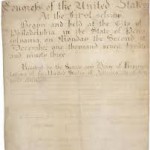The First United States Congress proposed 12 amendments to the Constitution in 1789. The states ratified ten of the proposed amendments: The Bill of Rights. The Fifth Amendment contains five procedural rights. If the government seeks to take someone’s life, liberty or property it must follow the Fifth Amendment’s rules. The Fifth Amendment “No person […]
11th Amendment Overrules the Supreme Court
The Supreme Court interprets the Constitution. If the Court makes an unpopular decision, the recourse is an amendment. This happened with the Eleventh Amendment. During the Revolutionary War a South Carolina merchant, Captain Robert Farquhar sold supplies to the State of Georgia on credit. Following the War, Georgia refused to pay Farquhar asserting that he […]
Constitution’s Origination Clause: Why Revenue Bills Start in the House, Part 3
Part 1 examined the history and purpose of the US Constitution‘s Origination Clause. Part 2 introduced the Senate practice of “gut and replace” that pretends to comply with the Origination Clause. This article explains why “gut and replace” violates the Constitution.[1] The Origination Clause provides that laws for raising revenue[2] must have started in the […]
The Fourteenth Amendment to the US Constitution
While the 13th Amendment abolished slavery, it did nothing regarding the legal status of the former slaves. The 14th Amendment gave them citizenship and did much more. At the end of the American Civil War Congress passed the Civil Rights Act of 1866 granting US citizenship to former slaves. The constitutional authority off Congress to […]
The US Constitution and Local Government
Discussions of the US Constitution tend to focus upon the actions of the president, congress and the Supreme Court. While these are consequential, often overlooked is the impact of the Constitution on the actions of local government. Most Americans are aware of the presidential oath of office required of a new president before he begins […]
Two NSA decisions: One for the Constitution, One for the Government
On December 27, Federal Judge William Pauley, of the Southern District of New York, admitted everything that, on December 16th, Judge Richard Leon indicated was wrong with the National Security Agency’s Data Collection and Surveillance[1] program and, unlike Judge Leon, decided the program was reasonable, lawful and constitutional. Pauley Admits the Dangers to Liberty, but Trusts the Government […]
Courageous NSA Ruling by Judge Leon Respects Privacy and Fourth Amendment
On December 16, 2013 US District Court Judge Richard Leon took on arguments[1] that over the years have been used to expand government intrusion into American life in ways that would have left James Madison “aghast”.[2] His opinion in Klayman v. Obama finds much of the National Security Agency’s (NSA) surveillance collection of “telephony metadata” […]
An Agency Theory of The Constitution as a Power of Attorney
“[W]e must never forget that it is a constitution we are expounding.” Chief Justice John Marshall, McCulloch v. Maryland (1819) Reviewing the 200 years of “expounding” the Constitution has undergone can be quite confounding. There have been hundreds of Supreme Court opinions. Legal scholars, lawyers, and judges engage in continuing debate over the proper method […]
Fourth Amendment Origins: Court Battles Lead to Revolution
“The house of every one is to him as his castle and fortress, as well for his defence against injury and violence as for his repose.” Sir Edward Coke,[1] 1604 “They who can give up essential liberty to obtain a little temporary safety, deserve neither liberty nor safety.” Benjamin Franklin,[2] 1755 “… one of the most essential branches […]














The Sword of Liberty: Constitutional Education and Adventure
Book Review: The Sword of Liberty by Loren J. Enns1 Thomas Jefferson expressed the sense of the Founders of the American Republic: “That whenever any Form of Government becomes destructive of these ends, it is the Right of the People to alter or to abolish it…” 2 The Constitution’s Article V reflects this principle, providing […]